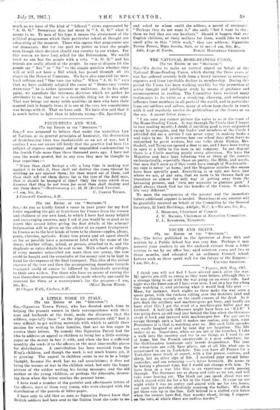A LITTLE WORK IN ITALY.
[To ens Enrroe or 7116 "SPECTATOR."1
Sus,--Signorina Teresa Pavesi, who has devoted much time to helping the peasant women in their correspondence with their sons and husbands at the front, made the discovery that the soldiers, especially those "on the Alpine mountains cold," find it very diffieult to get writing materials with which to satisfy their passion for writing to their families, that are no less eager to receive their letters. To remedy this Signorina Pavesi had the idea to address an appeal to children to bring her a little writing- paper or the money to buy it with, and when she has a sufficient quantity she sends it to the officers in the most inaccessible places for distribution. A contribution has been received from the King's children, and though the work is not much known yet, it is growing. The appeal to children seems to me to be a happy thought, because the work has no sad associations; it does not bring the terrors of war to the childish mind, but only the happy picture of the soldier writing his loving messages, and the old mother or the young children, or perhaps the fdanzata, devour. ing them when the letter reaches the peasant home.
I have reed a number of the grateful and affectionate letters of the othirers, most of them very young, who were charged with the distribution of the parcels of letter-paper.
I have only to add that as soon as Signorina Pavesi knew that British soldiers had been sent to the Italian front she came to one
and asked to whom could she address a parcel of notepaper. "Perhaps they do not want it,'•' she said; "but I want to shoe them we feel they ore our brothers." Should it happen Brit sal English ehiklren, or their- mothers for them, would like to send mall gifts to this "little work," they eau address: -Signorine Teresa Pavesi, Dopo Scuola, Sale, or to me.—I arn, Sir, Ac.,


























 Previous page
Previous page